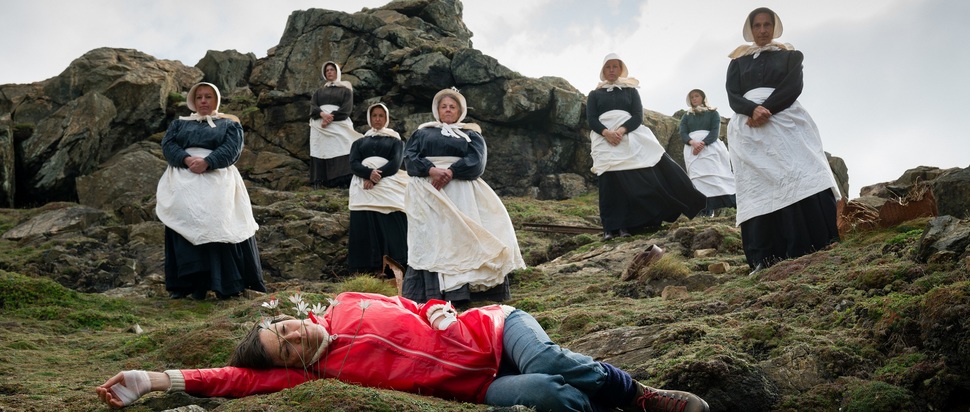Mark Jenkin on Cornish folk horror Enys Men
Mark Jenkin follows Bait with island tale Enys Men. We speak to him about folk horror, shooting on 16mm, and making work embedded in Cornish culture
Three years after Bait, Mark Jenkin returns with another proudly Cornish feature. Titled Enys Men, it follows a woman known only as The Volunteer (played by Mary Woodvine) as she goes about her solitary observations on an island. After its premiere in Cannes last summer, the film was quickly dubbed folk horror, but Jenkin has reservations about that very English genre. “I was worried we would be thought of as English folk horror,” he says. “It's really important that Enys Men is a Cornish film. I wanted to make something set in an undeniably Cornish context – historically, culturally, and linguistically. I’m interested in defining identity by what we are, rather than by what we're not.”
To Jenkin, specificity is far from limiting. “A story within a very authentic and specific setting can have a chance of being universal,” he says. “I can only do the bit of the world I have any intimacy with and understanding of, which is where I come from and where I still live. So it's going to be Cornwall because anything else would be inauthentic.” He decided not to subtitle the May song sung in Cornish: “it isn't narratively important to understand the language, but its presence is very important. The audience doesn't need to know the words. The language is in the room.”
Like Bait and Jenkin's most recent shorts, Enys Men was shot on 16mm film. The format has become his calling card and he's not intent on changing any time soon. “I love the camera I use. It forces me to not shoot location sound, which allows me to control the sound and sound design afterwards. It's form determining content, but also content determining form. It’s a big, amorphous way of working.”
The vivid colours captured throughout Enys Men are ones Jenkin feels are only possible on film. “Digital is very sophisticated, but I've never seen filmic red done digitally. There's something about film red that isn't like any other red.” In Enys Men, The Volunteer’s bright red jacket is hard to look away from. “It's sort of incongruous because red is a danger signal in nature. We're primed for red, and when you see a true film red it's alarming.”
The unearthly sounds of Enys Men were created by Jenkin with implements including metal reclaimed from a heritage steam railway and a tape run through two reel-to-reel machines. It’s a “hands-on analogue approach to taking clean, well-recorded sounds and making them decay,” he says. After these methods, as well as slowing and reversing noises and lines of dialogue, he works the sound to be “recognisable, but so abstracted as to become uncanny.” He finds audio a more effective way to unsettle than visuals. “If you can identify what's wrong, you can contextualise it and live with it or correct it. But if you know something's wrong but can't put your finger on it, that’s a very unnerving space to be in,” he says.
These small manipulations give Jenkin room for bold cinematic choices. “I'm a proudly unsubtle filmmaker when it comes to form. When it comes to the content and the theme at the heart, that's more ambiguous.”
This limbo is anchored by The Volunteer’s routine as she observes flowers above an abandoned mine. After the day’s work, she then codifies her leisure time in almost complete isolation. “The routine was important because there was little narrative development through dialogue,” Jenkin explains. With Enys Men delayed for a year due to the pandemic, routines became unwittingly relevant. “It was weird timing,” he says. “I wrote it ahead of the pandemic, but then routine became the heart of everybody's life. If you were not a key worker and you were at home, routine was the thing we clung on to.”
The delay proved fruitful rather than frustrating. “Enforced distance from a film is a real privilege,” he says, noting production moves quickly and precludes reflection. But he did not discuss the film with his partner Mary Woodvine, who plays The Volunteer. “I wanted her to find that character,” he says. It seems that Woodvine’s extroversion adds “internal conflict” to his innate introversion. Jenkin realises actors’ time on set is limited, so collaboration must be opportunistic. “The actors are only involved for the intense bit of the shoot, so you can't waste any of their input,” he says. “It's really important not to shut down possibilities. I don't have to put it in the edit, so I don’t have to be controlling.”
One of the most intriguing mysteries of The Volunteer’s routine is her daily dropping of a stone down a mineshaft. “A lot of people have said they’re not sure of the meaning of the stone, which I'd never thought about because it doesn’t have any meaning,” says Jenkin. “Maybe it's a Cornish thing. There are so many mine shafts in Cornwall. Everybody I know drops stones. It's in our culture. But once it's in the routine, it can be subverted for the sake of the narrative.” Perhaps a flooded mine still has its secrets.
Enys Men is released 13 Jan by BFI
